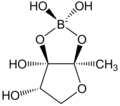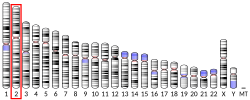Autoinducer-2 (AI-2) is a furanosyl borate diester or tetrahydroxy furan (species dependent) that—as the name suggests—is an autoinducer, a member of a...
8 KB (776 words) - 21:53, 4 November 2024
In biology, an autoinducer is a signaling molecule that enables detection and response to changes in the population density of bacterial cells. Synthesized...
31 KB (3,939 words) - 15:26, 9 July 2024
major groups are oligopeptides AIs in gram-positive bacteria; and autoinducer-2 (AI-2), as a universal signal for interspecies communications. It arises...
20 KB (2,396 words) - 20:49, 22 May 2025
"Characterization of autoinducer 2 signal in Eikenella corrodens and its role in biofilm formation". Journal of Bioscience and Bioengineering. 102 (2): 110–7. doi:10...
14 KB (1,577 words) - 13:16, 25 May 2025
Cholera autoinducer-1 (CAI-1) is an autoinducer signaling molecule present in the bacterium Vibrio cholerae, which causes cholera. CAI-1 is known structurally...
14 KB (1,823 words) - 20:04, 26 May 2025
DPD reacts with boric acid to form a borate diester known as autoinducer-2 (AI-2). AI-2 is a signaling molecule used for bacterial quorum sensing. It...
4 KB (324 words) - 17:49, 24 November 2024
about other species as well. This universal molecule is called autoinducer 2 or AI-2. AI-2 was first discovered in the light producing system of the bacteria...
7 KB (984 words) - 23:15, 24 September 2024
bacterium that uses a synthase (LuxI) to produce a species-specific autoinducer (AI) that binds a cognate receptor (LuxR) that regulates changes in expression...
6 KB (637 words) - 03:32, 26 October 2023
Methionine (redirect from 2-amino-4-(methylthio)butanoic acid)
leaving the compound dihydroxypentandione to spontaneously convert into autoinducer-2, which is excreted as a waste product or quorum signal.[citation needed]...
30 KB (3,083 words) - 04:36, 29 March 2025
S-ribosylhomocysteine lyase (redirect from EC 3.2.1.148)
involved in the synthesis of autoinducer AI-2 (autoinducer-2), which mediates quorum sensing in roughly half of bacterial species. AI-2, a furanosyl borate diester...
6 KB (639 words) - 04:25, 3 December 2023
autocrine signaling: a cell produces both an autoinducer molecule and the receptor for the autoinducer. As one example, quorum sensing enables bacteria...
91 KB (11,070 words) - 16:59, 26 May 2025
5-kinase EC 2.7.1.187: acarbose 7IV-phosphotransferase EC 2.7.1.188: 2-epi-5-epi-valiolone 7-kinase EC 2.7.1.189: autoinducer-2 kinase EC 2.7.1.190: aminoglycoside...
215 KB (21,664 words) - 05:19, 27 April 2025
Family 2.A.85 The Aromatic Acid Exporter (ArAE) Family 2.A.86 The Autoinducer-2 Exporter (AI-2E) Family (Formerly the PerM Family, TC #9.B.22) 2.A.87 The...
38 KB (5,159 words) - 15:41, 17 April 2024
inter-species signalling is mediated by 4, 5-dihydroxy-2, 3-pentanedione (DPD), also known as autoinducer-2 (Al-2). The evolution of the human oral microbiome can...
34 KB (3,983 words) - 02:48, 2 June 2025
"Regulation of Bacterial Biofilm Formation by Ultrasound: Role of Autoinducer-2 and Finite-Element Analysis of Acoustic Streaming". Ultrasound in Medicine...
14 KB (2,474 words) - 21:45, 7 April 2025
transporter * EC 7.6.2.12: ABC-type capsular-polysaccharide transporter * EC 7.6.2.13: ABC-type autoinducer-2 transporter * EC 7.6.2.14: ABC-type aliphatic...
9 KB (1,043 words) - 23:41, 28 December 2024
W. (2012-10-01). "Bifidobacterium spp. influences the production of autoinducer-2 and biofilm formation by Escherichia coli O157:H7". Anaerobe. 18 (5):...
7 KB (744 words) - 19:37, 20 October 2024
Acyl-homoserine-lactone synthase (redirect from Autoinducer synthase)
AHL synthase, AHS, AHSL synthase, AhyI, AinS, AinS protein, autoinducer synthase, autoinducer synthesis protein rhlI, EsaI, ExpISCC1, ExpISCC3065, LasI...
5 KB (537 words) - 12:57, 26 August 2023
the ain system, uses the autoinducer C8-HSL, which is produced by the protein AinS. Similar to the lux system, the autoinducer C8-HSL increases activation...
36 KB (3,713 words) - 14:03, 23 May 2025
LuxR, encoded by luxI and luxR respectively. LuxI is autoinducer synthase that produces autoinducer (AI) while LuxR functions as both a receptor and transcription...
49 KB (5,609 words) - 21:40, 22 May 2025
called an autoinducer, which was not identified until 1981. In 1985, Greenberg reported that, instead of a complex mechanism, the autoinducer simply passively...
19 KB (1,718 words) - 13:40, 24 May 2025
Pseudomonas quinolone signal (redirect from 2-heptyl-3-hydroxy-4-quinolone)
sensing are called autoinducers, which are communicatory molecules that can induce conformist actions among a group. Specific autoinducers are used to influence...
7 KB (779 words) - 04:06, 27 May 2025
Apolipoprotein B (category Genes on human chromosome 2)
infection. The mechanism of antagonism entails binding ApoB, to a S. aureus autoinducer pheromone, preventing signaling through its receptor. Mice deficient...
39 KB (4,836 words) - 18:00, 25 May 2025
mechanism of antagonism entails binding apolipoprotein B to a S. aureus autoinducer pheromone, preventing signaling through its receptor. Mice deficient...
63 KB (6,996 words) - 21:23, 29 May 2025
Quinolone antibiotic (redirect from 2- and 4-Quinolones)
Cámara M (March 2011). "Quinolones: from antibiotics to autoinducers". FEMS Microbiology Reviews. 35 (2): 247–274. doi:10.1111/j.1574-6976.2010.00247.x. PMC 3053476...
69 KB (6,855 words) - 22:01, 29 May 2025
conclusion is twofold: When autoinducers are costly, any microbial strain that simultaneously produces both the autoinducer and mixed goods is unlikely...
17 KB (2,067 words) - 23:17, 25 May 2025
involves the secretion by individual cells of 'signaling' molecules, called autoinducers or pheromones. These bacteria also have a receptor that can specifically...
35 KB (4,500 words) - 22:25, 29 May 2025
which may utilize autoinducers or other mechanisms in order to restrict colonization by V. cholerae or other enteropathogens. Autoinducers, specifically with...
50 KB (5,818 words) - 15:36, 30 April 2025
C-terminal region of the protein; the N-terminal region often containing an autoinducer-binding domain or a response regulatory domain. Most luxR-type regulators...
8 KB (877 words) - 14:54, 3 December 2023
Semmelhack MF, Bassler BL (2007-11-14). "The major Vibrio cholerae autoinducer and its role in virulence factor production". Nature. 450 (7171): 883–886...
93 KB (9,848 words) - 06:04, 22 April 2025

















